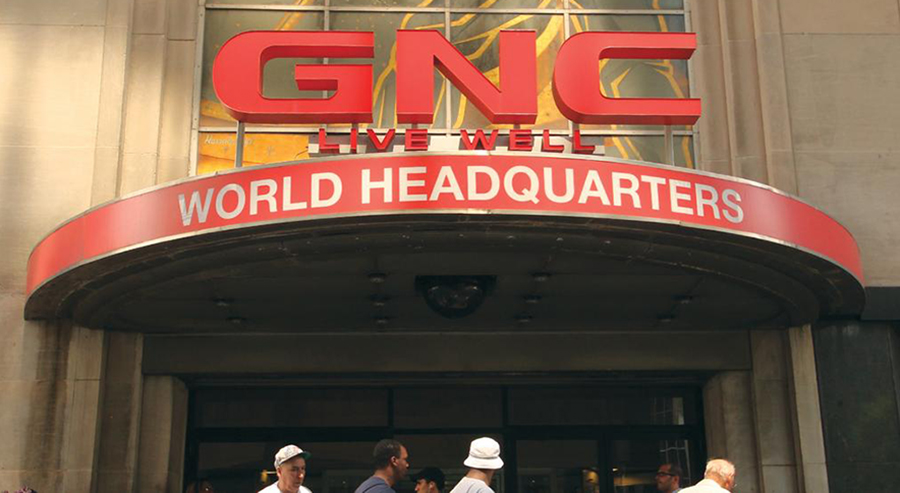GNC Holdings Inc. said it has filed for chapter 11 bankruptcy protection with plans to sell itself and close 800 to 1,200 of its roughly 7,300 locations.
The Pittsburgh-based vitamin-and-supplement retailer, along with its secured lenders and key stakeholders, has reached an agreement to pursue a dual-path process that will allow the company to restructure its balance sheet and accelerate its business strategy through Chapter 11 of the U.S. Bankruptcy Code. GNC expects the Chapter 11 process will benefit its stakeholders and best position the company for long-term success. U.S. and international franchise partners and all corporate operations in Ireland are separate legal entities and are not a part of the filing.
GNC and all of its subsidiaries remain open for business.
Lender and Stakeholder Support to Enable a Swift, Orderly Process
GNC said importantly, the overwhelming support of the company’s creditors will enable GNC to emerge from this process expeditiously. GNC enters this dual-path process with a signed restructuring support agreement (RSA) that is executed by more than 92 percent of Term Lenders and 87 percent of ABL FILO Lenders (collectively, the “Supporting Secured Lenders”). The company and these Supporting Secured Lenders have reached an agreement on a pre-arranged standalone plan of reorganization.
Additionally, the company, a significant majority of the Supporting Secured Lenders, and Harbin Pharmaceutical Group Holding Co., Ltd., an affiliate of GNC’s largest shareholder, have also just reached an agreement in principle for the sale of the company’s business. The term sheet documenting that agreement outlines a $760 million purchase price for the sale transaction, which would be executed through a court-supervised auction process at which higher and better bids may be presented. The sale transaction is subject to mutually acceptable definitive documentation. In support of the proposed sale path, GNC has commenced a comprehensive marketing process for its business. If the sale transaction is timely consummated as outlined, it would be implemented instead of the standalone plan transaction.
GNC’s largest vendor and a joint venture partner, IVC, is working with the company to ensure a continued supply of products to the company and advance the proposed sale of GNC’s business.
With the support of its lenders and key stakeholders, the company expects to confirm a standalone plan of reorganization or consummate a sale that will enable the business to exit from this process in the fall of this year.
GNC has secured approximately $130 million in additional liquidity through (i) a commitment from certain of its term lenders to provide $100 million in “new money” debtor-in-possession (DIP) financing and (ii) approximately $30 million to come from certain modifications to the existing ABL credit agreement. The company is confident that between financing and cash flow from normal operations, and with the continued support of its largest vendor, GNC will meet its go-forward financial commitments as it works to achieve its financial objectives.
Accelerating Business and Brand Strategy to Evolve GNC for the Future
As outlined in both potential paths, the company expects to use this process to improve its balance sheet and capital structure while continuing to advance its business strategy, right-size GNC’s corporate store portfolio, and strengthen its brands to protect the long-term sustainability of its business.
Over the past year, GNC has been executing a store portfolio optimization strategy to close underperforming stores, while continuing to invest in omnichannel and brand strategies to better meet consumer demand. This process will enable GNC to accelerate these strategies, including its store portfolio optimization. GNC expects to accelerate the closure of at least 800 to 1,200 stores. This acceleration will allow GNC to invest in the appropriate areas to evolve for the future, better positioning the company to meet current and future consumer demand around the world.
GNC said in its statement, “GNC remains committed to delivering wellness solutions to its consumers through easier and enhanced options to live well, from a strong product pipeline to an improved e-commerce experience. The company will be launching the option to buy-online-pick-up-in-store later this year and has a robust innovation pipeline of ingredients and products to bring to market over the next three years. With an 85-year history of science-backed innovation, the GNC brand remains a strong, trusted source for health and wellness products, which are increasingly important in today’s environment.”
Additional information about the case and a current list of store closures can be found at GNC’s dedicated microsite, GNCevolution.com. Claims information can be found here.
Photo courtesy GNC
















